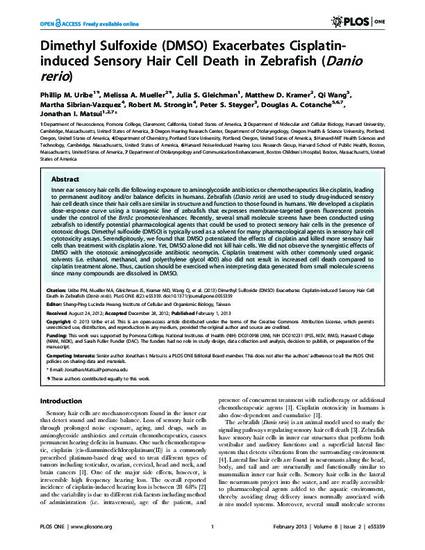
Inner ear sensory hair cells die following exposure to aminoglycoside antibiotics or chemotherapeutics like cisplatin, leading to permanent auditory and/or balance deficits in humans. Zebrafish (Danio rerio) are used to study drug-induced sensory hair cell death since their hair cells are similar in structure and function to those found in humans. We developed a cisplatin dose-response curve using a transgenic line of zebrafish that expresses membrane-targeted green fluorescent protein under the control of the Brn3c promoter/enhancer. Recently, several small molecule screens have been conducted using zebrafish to identify potential pharmacological agents that could be used to protect sensory hair cells in the presence of ototoxic drugs. Dimethyl sulfoxide (DMSO) is typically used as a solvent for many pharmacological agents in sensory hair cell cytotoxicity assays. Serendipitously, we found that DMSO potentiated the effects of cisplatin and killed more sensory hair cells than treatment with cisplatin alone. Yet, DMSO alone did not kill hair cells. We did not observe the synergistic effects of DMSO with the ototoxic aminoglycoside antibiotic neomycin. Cisplatin treatment with other commonly used organic solvents (i.e. ethanol, methanol, and polyethylene glycol 400) also did not result in increased cell death compared to cisplatin treatment alone. Thus, caution should be exercised when interpreting data generated from small molecule screens since many compounds are dissolved in DMSO.
Copyright 2013 Uribe et al. This is an open-access article distributed under the terms of the Creative Commons Attribution License, which permits unrestricted use, distribution, and reproduction in any medium, provided the original author and source are credited.
Available at: http://works.bepress.com/robert_strongin/40/

At the time of publication, Douglas A. Contanche was not yet affiliated with the University of Massachusetts Medical School.